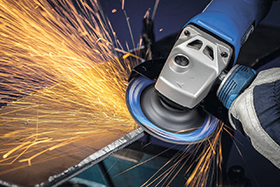

“The pace of development in metal fabrication is as fast as it is in general manufacturing,” says Dennis Phillips, national sales manager at PFERD South Africa. Key technology trends advancing the sector include automation; modern CNC machines; reshoring; cybersecurity; collaborative robotics; 3D printing or additive manufacturing; digitisation; and Industry 4.0. In addition, fabricators are under pressure to use these technologies to deliver on sustainable development, energy and resource efficiency, workplace safety, and ergonomics.
From a South African perspective, several of these stand out. In light of our energy crisis, sustainability and energy efficiency take on another level of importance. Due to electricity supply constraints, the South African Reserve Bank’s 2023 GDP growth forecast is now revised down to 0,3%, from 1,1%. The sectors most affected by loadshedding are agriculture, mining and manufacturing.
“In the metal fabrication space, PFERD’s high-performance abrasives play a vital role. We have launched the CC-GRIND ROBUST, a patented modern and high-performance grinding solution developed with environmental sustainability, productivity, and ergonomics in mind,” says Phillips.
PFERD CC-GRIND ROBUST is an advanced and ergonomic alternative to conventional grinding discs, flap discs and fibre discs. This innovative solution can transform metal stock removal processes to maximise productivity, cost-effectiveness, and operational efficiency. Its high performance and ergonomic design make it an obvious choice for forward-looking fabricators.
The CC-GRIND ROBUST consists of ceramic grains, optimally aligned on a glass fibre backing. The ROBUST SGP version is part of PFERD’s VICTOGRAIN family consisting of triangular-shaped ceramic grain. This enables an extremely high stock removal rate to be achieved, which significantly reduces processing time, resulting in significantly improved overall productivity,” explains Phillips.
Ceramics have a significant advantage over conventional abrasive grains such as aluminium oxide due to their ability to continuously self-sharpen. As ceramics are used, their grains break down gradually, revealing new sharp cutting edges that consistently and aggressively cut throughout the product’s lifespan.
With the SGP version of the ROBUST, the self-sharpening characteristics and grinding performance are even more pronounced. “VICTOGRAIN starts as triangles and is constructed to break down in a pre-defined and controlled manner,” Phillips explains. “When the triangular grain breaks down, new and equally sharp cutting edges are formed to sustain the abrasive’s aggressive and fast grinding properties.”
Key advantages for fabricators include:
• Reduced component processing times, which enables more work to be completed in less time.
• Despite its aggressive stock removal rate, the ROBUST still achieves a consistent and high-quality surface finish. The lightweight design means an operator can easily guide the abrasive for more precise stock removal.
• Because stock removal is more efficient, substantial temperature reductions in the grinding zone can be achieved, reducing, or removing the need for additional processing steps to remove heat discolouration.
• The ergonomic and lightweight design results in increased comfort, better safety, and significantly reduced levels of dust, noise and vibration.
• The use of ROBUST places less strain on machinery, which reduces the need for frequent replacements, and ultimately leads to lower operational expenses.
• Adapted tool geometry eliminates the need for special clamping flanges, making the CC-GRIND ROBUST compatible with all commercially available angle grinders.
The ROBUST product range is ideal for tasks on steel and stainless steel such as surface grinding, weld dressing, deburring, chamfering, and removing imperfections. In terms of resource use, the longevity of the CC-GRIND ROBUST improves sustainability, while productivity and quality improvements make it more energy and cost-efficient.
“There is no doubt that the metal fabrication industry in South Africa is being influenced by global trends. Shipping and offshore fabrication costs are becoming far less competitive, which is likely to make reshoring more attractive. Automation, robotics, and CNC machining are no longer new to us; and digitisation and the IOT are here and advancing, as is additive manufacturing.
“PFERD is at the forefront of these developments, providing the advanced abrasives and tools needed to deliver the high quality surface finishes needed in modern metal fabrication. Our solutions are ideal for those under pressure to deliver on rapid production, sustainability and resource efficiency targets, while continuing to sustain high quality and low production costs,” Phillips concludes.

© Technews Publishing (Pty) Ltd | All Rights Reserved